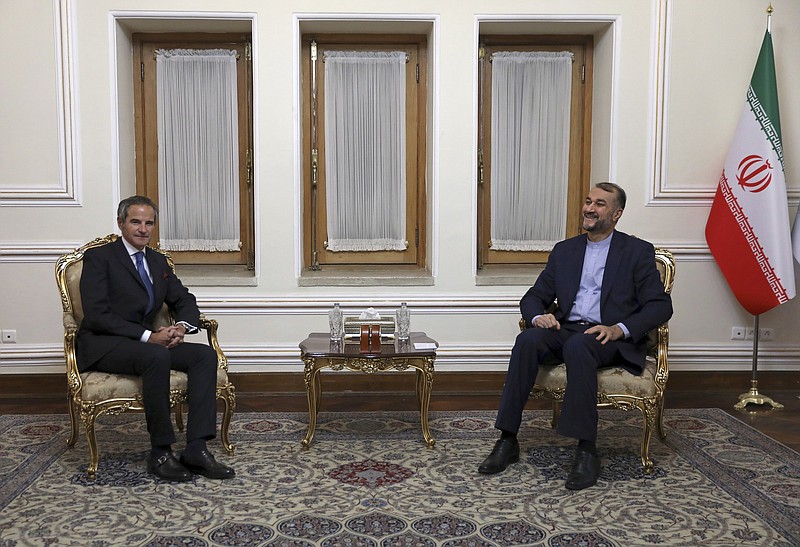VIENNA -- The head U.N. nuclear watchdog warned Wednesday that his inspectors are close to being unable to "guarantee" they know what's going on at all of Iran's nuclear sites.
Rafael Mariano Grossi's words sharply contrasted with the optimistic tone his Iranian hosts offered Tuesday. They signal the Islamic Republic's harder line as renewed talks over Tehran's tattered nuclear deal with world powers are to resume next week.
They also represent a stark alarm for nuclear nonproliferation experts after Grossi's trip to Tehran produced no breakthrough to restore its ability to fully monitor the program.
Grossi said the International Atomic Energy Agency's inspectors remain unable to access surveillance footage and face greater challenges in trying to monitor Tehran's rapidly growing uranium stockpile, some of which is now enriched up to 60% purity -- a short technical step from weapons-grade levels of 90%.
Many in the West believe Iran is coming ever closer to having the know-how and material to fashion a nuclear weapon, despite its repeated insistence of peaceful intent.
"Our negotiations have been inconclusive, meaning that we could not finish," Grossi told reporters in Vienna, where the agency is based, after addressing the agency's board of governors. "I'm not giving up on trying to find some understanding, but in terms of what we were discussing yesterday, we could not conclude an agreement."
Pressed on whether any progress had been made, Grossi said that "in terms of the substance, no, quite clearly, we were not able to make progress." However, he said that having gotten to know the new Iranian officials was "a positive element" and "this will certainly help."
But he warned: "We are close to the point where I would not be able to guarantee continuity of knowledge." He did not specify a time frame, but said a long lack of access to a centrifuge parts production site near the northern city of Karaj "would at some point prevent me from continuing to say that I have an idea of what is going on."
According to The Wall Street Journal, Iran refused to offer the agency access to Karaj unless it dropped parts of a long-running inquiry into the discovery of undeclared nuclear material in Iran, raising concerns that Tehran is hiding past or current nuclear military activities.
On Tuesday, Grossi went to the Atomic Energy Organization of Iran, the country's civilian nuclear agency, and met its new head, Mohammad Eslami. He also met Foreign Minister Hossein Amirabdollahian, who said Iran was determined to have "constructive engagement" with the agency to "improve mutual trust and cooperation," according to a report by the state-run IRNA news agency.
Under a confidential agreement called an Additional Protocol with Iran, the International Atomic Energy Agency collects and analyzes images from a series of surveillance cameras installed at Iranian nuclear sites. Those cameras help it monitor Tehran's program to see if it is complying with the nuclear deal.
Iran's hard-line parliament in December 2020 approved a bill that would suspend part of U.N. inspections of its facilities if European signatories did not provide relief from oil and banking sanctions by February. Since then, the agency has been unable to access imagery from the cameras.
Under the deal, the agency also placed around 2,000 tamper-proof seals on nuclear material and equipment. Those seals communicated electronically to inspectors, and automated measuring devices also provided real-time data from the program. Inspectors haven't been able to access that data either, making the task of monitoring Iran's enriched uranium stockpile that much more difficult.
The agency also has sought to monitor activities at the centrifuge parts production site near Karaj. The agency has had no access there since June after Iran said a sabotage attack by Israel considerably damaged the facility and a camera there.
Grossi on Wednesday insisted that despite this week's lack of progress, a solution must be found. "We must reach an agreement," he said. "We must do it."
Henry Rome, an analyst at the Eurasia Group, warned that Iran's stance "reflects poorly on the outlook for the nuclear talks" in Vienna.
"Iran may calculate that its unconstrained nuclear advances and unmonitored centrifuge production will put more pressure on the West to give ground in talks quickly," Rome said. "But it will likely have the opposite effect."
Senior diplomats from Britain, China, France, Germany and Russia plan to meet Iranian officials in Vienna on Monday to discuss bringing Tehran back into compliance with the 2015 deal, known as the Joint Comprehensive Plan of Action, which eased sanctions on Iran in return for curbs on its nuclear program.
President Joe Biden is in negotiations to bring the United States back into the 2015 deal, which former President Donald Trump renounced more than three years ago.
Information for this article was contributed by Philipp Jenne, Geir Moulson and Jon Gambrell of The Associated Press; and by Steven Erlanger of The New York Times.
